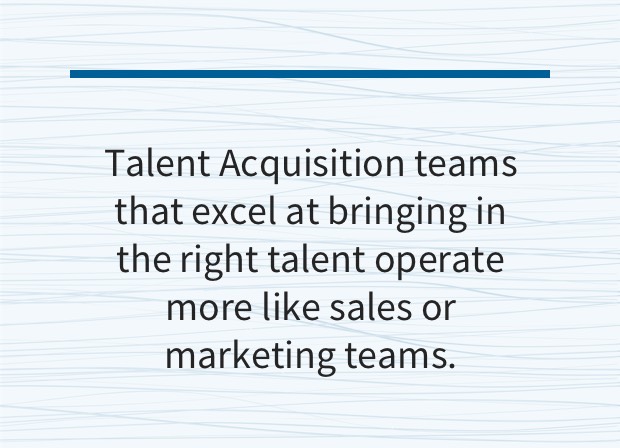How to Create Hiring Success
Now that we can measure Hiring Success, what are the biggest differences between high performing and low performing companies? There are many factors that contribute to an organization’s hiring success but ultimately, winners in the talent war tend to have optimized the following three core pillars:


Qualified candidates suffer no lack of job opportunities, therefore companies must flip the old school model of tracking & replying to candidates on their own time, in their own way and move towards a candidate-centric marketing approach that treats candidates just as well as they do prospective new customers. Recruiting is essentially marketing the organization, the brand, and the opportunity to as many interested, qualified candidates as possible. Organizations who offer a more compelling overall candidate experience – one in which a candidate’s time and efforts are treated with respect and transparency throughout each stage of the acquisition funnel – routinely outperform their peers not just in hiring but in business as a whole. For example, the Talent Board’s research states that almost 50% of candidates who had a bad recruitment experience with a company would definitely take their product purchases and relationships somewhere else.

This means bad candidate experience can impact not only your ability to attract high quality talent but your bottom line as well.
Delivering a successful candidate-centric marketing approach at any organization can be broken down into five core constructs:

An Authentic Voice & Brand:
Candidates today care a great deal about a corporation’s purpose, culture and the impact they can make. Companies must market why people should join them in an enticing but genuine manner.

Ease to Express Interest / Connect:
It must be incredibly easy for candidates to connect with and apply for positions on any device they choose. The days of tedious, time-consuming application forms are long gone.

Speed & Ownership of Responses:
We live in a world of short attention spans. Candidates expect timely responses at each stage of their interactions with the company and recruiters. Long periods of silence won’t be tolerated and will be shared on social media.

Structured Process & Discussions:
Candidates want their time to be respected and to very clearly understand where they stand in the hiring process. Companies must have well defined hiring processes with the right number of interviewers and clear next steps.


All too often, the Recruiting organization is seen as solely responsible for recruiting which is grammatically correct but logically ludicrous. Hiring is a team sport in which all the relevant people in your organization (i.e. the hiring teams) need to collaborate effectively to make the right hiring decisions for a given role. In this reality, the business and hiring managers bear primary responsibility for hiring great people. They must partner closely with their recruiting peers and take proper accountability for their portion of the recruiting process for each and every one of their hires.
When hiring managers feel included and are engaged heavily throughout the process with hiring teams collaborating effectively, organizations act more quickly, make better hiring decisions, and have far higher candidate acceptance rates. The ideal recruiter / hiring manager partnership can be broken down into four core constructs as well:

Ideal Candidate Profile / Process:
Hiring managers must define, with their recruiting peers, the job description and the ideal candidate profile (skills and past experiences) as well as the actual hiring process and evaluators involved.

Structured Review Scorecard:
Hiring managers and recruiters establish a clear evaluation scorecard to be used by all members of the interview team to ensure a fair, structured and timely hiring decision.

Effective Communication Transition:
There is clear ownership of candidate communication for each stage of the recruiting funnel, with hiring managers owning this once candidates have been interviewed.

Decision Ownership & Communications:
Hiring managers must own the final decision on whether to hire / pass on a candidate. As soon as decisions are made, they must be communicated quickly and clearly, especially if the answer is a NO. Hiring managers must close the YES candidates.


It is time to finally abandon the view that the recruiting team is merely one of many standard HR departments, operating within a set of very specific HR workflows. In reality, this team is the only group of people dedicated to connecting to and reeling in the next great infusion of that company’s talent. Talent Acquisition teams that excel at bringing in the right talent operate more like sales or marketing teams focused on building a qualified pool of talent that they can nurture and engage with on a regular basis. Best-in-class recruiting teams with high degrees of productivity exhibit the following five attributes:

High IQ Sourcers:
Great recruiters are marketers first and effectively build talent pipelines and nurturing programs while optimizing their dollars and efforts towards the sourcing channels that have the highest yield.

Strong Command of Data & Priorities:
Great recruiting teams know “their numbers” and leverage them to not only prioritize the many tasks across the hiring spectrum but also provide accurate hiring forecasts to the business.

Amazing Communicators:
The best teams understand how to personally connect to and reel in talent, while over delivering on communicating to and engendering trust with candidates across every stage of the talent funnel.

Clear Processes, No Chasing:
Every role and every candidate is run through a consistent process where next steps and owners are well understood. Recruiters don’t waste time chasing down hiring teams for feedback / decisions.

Integrated Workflows:
Great TA teams have one set of integrated tools that they use across the hiring spectrum. They don’t waste precious time re-keying data nor lose precious candidates who get lost in a multi-system maze.















